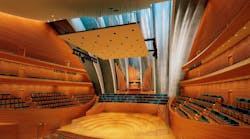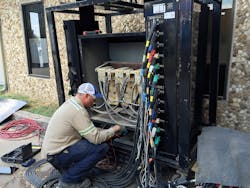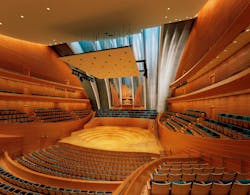When a rock star sings into a microphone, a spotlight lights up the stage, or special effects dazzle the audience, an electrician is often working hard behind the scenes to help make this happen. Nearly every performance — from a concert to an opera — is powered by a team of electricians and technicians who work together to bring a performance to life. In the entertainment industry, electricians are as important to live event production as any other department, such as rigging, audio, and management, says Richard Cadena, an Entertainment Technician Certification Program (ETCP)-certified entertainment electrician.
“The technology is rapidly advancing, and without trained techs and electricians who can set up a system, test it, and troubleshoot it, there would be no show — and without over-the-top production, audiences would soon lose interest and stay home to watch Netflix,” Cadena says. “Come to think of it, if there were no electricians to light the set, there would be no Netflix either. And who is going to stay home and listen to the radio?”
In live event production, the term, “electrician” originated in a time when lights were controlled by saltwater dimmers or variable resistor dimmers. Back in the 1970s during a Chorus Line production, the workers, who were called “electricians,” made the electrical connections and then moved large levers to control the light levels, he says.
“In the entertainment industry, electricians basically deal with anything that is plugged in,” Cadena says.
Today, not all “electricians” who work in the stage and film industry are licensed electricians, but those who are trained and certified are often ahead of the game, Cadena says.
“Licensed commercial electricians have the advantage of understanding power distribution, electrical safety, and especially codes and regulations,” Cadena says. “On the other hand, working as an entertainment electrician is a whole new ball game, and we do things very differently than the rest of the world.”
For that reason, the entertainment industry has specific sections in the National Electrical Code (NEC), including Articles 252, 520, 530, and others. Even authorities having jurisdiction (AHJs) sometimes misunderstand the subtleties of the Code as it applies to theaters, motion picture production, and performance areas, he says.
In the entertainment industry, manufacturers design the equipment to meet UL compliance for portable equipment. A long as it’s used correctly, it’s safe, Cadena says.
“These days, it’s very rare that any of us has to work live, although that used to not be the case,” he says. “As long as all of the equipment is grounded and bonded, then it’s very rare that we have electrical accidents. There have been a number of stage electrocutions, but those almost always involve faulty grounding and could have been prevented with the use of GFCIs.”
Entering the entertainment industry
To fully grasp the differences between working as an electrician in the entertainment field and other markets, it’s often beneficial to gain exposure to the live production industry. For example, Eric Miller, production services manager for the Kauffman Center for the Performing Arts in Kansas City, Mo., advises those who are interested in the industry to either earn a degree in theater or venue management and/or have years of experience working in the entertainment field.
After working for the Worlds of Fun amusement park, a school district, and a casino, Miller joined the Kauffman Center for the Performing Arts in 2011. Miller, who earned his bachelor’s degree in theater, is currently working toward an ETCP certification as an entertainment electrician.
As the production manager, Miller oversees all lighting and electrical needs for the Kauffman Center and supervises the work of the local crews who assist with each show. In his current job, he does not follow a set schedule. Some days, he may get into work at 6:30 a.m., and others he may not return home until 3 a.m.
“There are days that last for 18 hours, but then there are days that last only four,” says Miller, who has had a lifelong passion for music and electronics. “I do work a lot of nights and weekends, but my boss does a good job of keeping the hours down to an average of 45 hours a week. We also have days off to make up for the long days. I may not see my kids for a day or two, but when you get three or four days off in a row you can make up for it.”
One of the reasons Miller enjoys his job is that there is no typical day. When he is assigned a show — which can range from a live concert to a graduation — he and his team begin advancing all the technical details, which include lighting, sound, video, staging, staffing, security, and scheduling of dock spaces. On “show day,” his team starts with unloading trucks, tying in shore power if needed for tour buses, and running miles of cables. Then he works on rehearsal and sound checks prior to the event. After the event is over, he works on striking everything and starting fresh for the next event.
Since he is working on live stage productions, he sometimes has to come up with spur-of-the-moment solutions. For example, if a microphone or luminaire gets unexpectedly shifted in front of a scenic piece that needs to be moved, the team needs to quickly respond.
“It can be very rewarding when our production team finds a solution to the problem that either flows well with the event or is completely invisible to the audience,” Miller says. “It’s satisfying when an event goes so well that the client returns and asks the team to manage the event again.”
Living life on the road
While some entertainment electricians serve a particular venue, others travel nationwide to illuminate and power live events. Just ask Cadena, who has literally written the book on how to work in the industry. As the author of several books on lighting technology and entertainment electricians, Cadena has worked on concert tours, TV shows, theater productions, house of worship ceremonies, corporate events, and movie productions. Since the advent of streaming online music, artists must tour to make money, so touring is now big business, which has stimulated the market, Cadena says.
“This is a very busy time for the entertainment industry,” Cadena says. “Everyone seems to have as much work as they can handle. If you happen to live in one of the entertainment centers like Las Vegas, Nashville, New York, Chicago, Los Angeles, or Orlando — or if you are willing to relocate — that helps a lot.”
As an entertainment electrician, responsibilities can vary greatly, depending upon a position on the crew. For example, a stage hand on the electric crew is typically assigned tasks — ranging from unloading a truck to assembling a rig to programming a lighting console. In some cases, a stage hand may be responsible for setting up and monitoring one particular area, such as a “dimmer beach,” where the power distribution racks and/or dimmer racks are located. Head electricians often handle tasks such as calculating loads, designing the power distribution system, circuiting the system, assigning channels, handling documentation, and hiring the crew.
A typical day for an electrician in the entertainment industry depends heavily on which aspect of the industry he or she works in. For example, in the concert/touring arena, a head electrician will spend weeks or months circuiting the lighting plot and documenting it. Next, the electric crew will prep the tour by pulling the gear, testing it, setting it up, labeling it, breaking it down, and loading it on trucks. While on tour, there is little to no time for sleep for the production crew, and the electricians must often race against the clock, Cadena says.
“When there’s a show, there is no time for messing around,” he says. “If you don’t do your job and get the rig up and running by show time, then the powers that be will find someone who can.”
Most of the challenges that the crew faces today, however, can be overcome with a little time and effort. Rather than repairing equipment in the field, the team usually swaps it out and then deals with it later due to time constraints.
“We usually have spare everything,” Cadena says. “We often run redundant control cables, and carry spare fixtures just in case.”
These days, he says the gear is also much more reliable than in the past.
“It used to be the Wild West, but now the industry has matured, and there is a proven system that is often duplicated over and over,” he says. “Once a tour is up and going, it is often on autopilot. There is nothing more gratifying than watching the house go to blackout, the band comes on stage, and then you push the ‘go’ button and watch the stage come to life while you listen to the roar of the crowd. It gives me goose bumps every time.”
Another perk of working in the live entertainment industry is having the opportunity to meet the rich and famous “talent.” While many are interested in their privacy, some are interested in the work that happens behind the scenes. Case in point: While working for an automated lighting manufacturer, he helped to install the first automated lights on the set of Saturday Night Live. Two of the actors (Phil Hartman and Chris Farley) noticed the new lighting and struck up a conversation with Cadena.
Many times, when you meet the talent, they are either uninterested in who you are or what you do, or they might be superficially nice, just playing along,” Cadena says. “But both of these guys were just regular people who were curious about something that was new to them. It felt like a genuine connection. Sadly, both passed away a few years later.”
Cadena says being part of live event production is richly rewarding.
“Live event production is the proving grounds for lots of technologies like automation, video, computers, and networking,” he says. “It rewards the creative application of technology, and it thrives on creating a spectacle.”
By working as an entertainment electrician, he says you can make people happy, help them to forget their cares for a little while, and make a decent living doing something genuinely fun and interesting.
“It often provides a vehicle to travel around the world, meet some very interesting people, and make enough money to raise a family,” Cadena says.
Within the entertainment industry, opportunities are available for those who are willing to embrace challenges and work hard, Cadena says.
“Regardless of which aspect of the industry you work in, it is project-based work, and most of the projects are short-term,” he says. “You find yourself in different situations, in different venues, working with different people, and with different technology. The technology is constantly changing, which can be both challenging and stimulating as long as you’re open to change.”
Fischbach is a freelance writer based in Overland Park, Kan. She can be reached at [email protected].
SIDEBAR 1: A Day in the Life of a Rock Star Electrician
Entertainment electricians can illuminate the live stage and power electrical equipment in a variety of venues. Here is a typical day for an electrician who travels with a production crew on a live band tour.
6 a.m. When the tour starts, the team jumps on a bus, travels to the gig, rolls off the bus, and then eats breakfast.
8 a.m. The workers focus on the load in and try to get the rig up and working by noon.
Noon. The crew eats lunch.
1 p.m. The team works on tweaking the rig, repairing broken fixtures, and addressing any problems that pop up.
3 p.m. The band performs a sound check.
6 p.m. The doors to the venue open while the crew eats dinner.
8 p.m. to 11 p.m. The band plays live on stage.
11:15 p.m. As soon as the band finishes its performance, the crew breaks down the rig and loads it out.
1 a.m. The crew closes the door on the last truck, and the members jump back on the bus and sleep while they travel to the next gig. Then, the schedule starts all over again.
SIDEBAR 2: Breaking into Show Business
Entertainment electricians can illuminate stars on a live stage or work behind the scenes on movie productions. To get a foot in the door, electricians can follow these tips from Richard Cadena, who has trained entertainment electricians for the last 11 years.
1. Get on the overhire list. During the busy times of the year, the International Alliance of Theatrical Stage Employees (IATSE) union will call members and then start calling those who have signed up on the overhire list.
2. Work your way up. Many production companies also hire unexperienced people who are willing to start at the bottom by coiling cable and learning on the job. If they show some promise, they can end up going out on some large jobs.
3. Make contacts. “Breaking into the industry is not terribly difficult if you really want to get in,” Cadena says. “It helps if you know someone in the industry who can introduce you to people and companies who are hiring.”
4. Get training. “With a few exceptions, most people were taught by somebody who was taught by somebody, but if you take classes, you can leap ahead,” he says.
5. Go back to school. Increasingly, colleges and universities are including some electrical training within their theater tech programs, but it’s often an area of specialization. For example, the University of Nevada at Las Vegas offers the Stage Technician Education and Development Intensive program, which helps to prepare participants for a career in live event production.
6. Get certified. The Entertainment Technician Certification Program (ECTP) offers two certifications: the Entertainment Electrician and the Portable Power Distribution Technician (PPDT). The Entertainment Electrician certification encompasses power calculations, setting up power distribution equipment, electrical safety, codes and regulations, documentation, and control systems. The PPDT certification covers everything in the original exam with the exception of control systems. While the Entertainment Electrician certification is intended for the top third of the industry, the PPDT is designed for about 50% of the industry. “You have to have experience in the industry to qualify to take the exam, and it’s not a trivial exam,” says Cadena.




